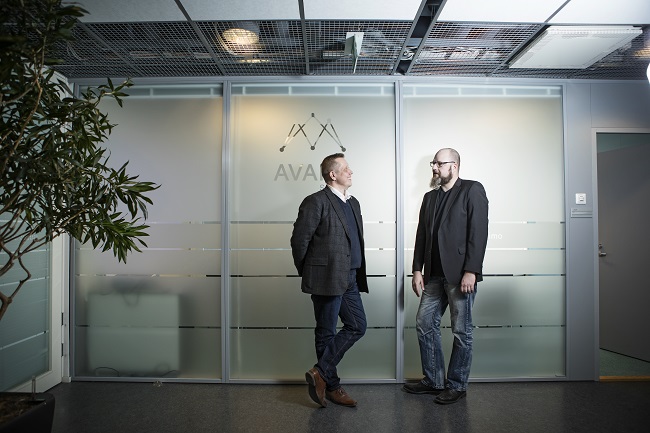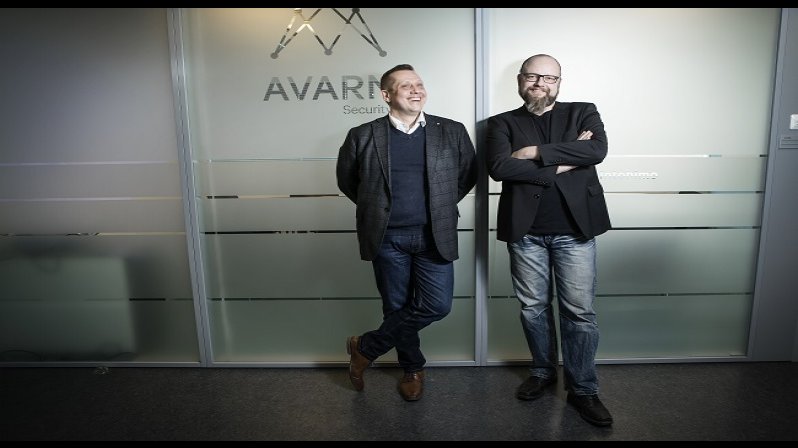Local agreement is familiar at AVARN Security: Agreements are only made on matters that the parties agree on
Juha Mustonen and Toni Lindgren negotiate working conditions together, both at their workplace at AVARN Security and when fleshing out the collective agreement for the security sector.
The words on the glass walls of the modern office read: cooperation, trust and courage.
These words appear like sound advice for local agreement, but they also happen to be AVARN Security’s values. The two men, wearing dark jackets, share a joke by the glass wall. Juha Mustonen is AVARN’s administration and HR manager, Toni Lindgren is the head shop steward. The company is one of the largest in the security sector in Finland.
The general opinion seems to be that local agreement is also bad for employees, which in my view is not the case at all, Lindgren wonders.
Why does the security sector like local agreement, which is still in its infancy in shops for example? Here in Pitäjänmäki, Helsinki it emerges that local agreement takes time, thought and good relations between employers’ representatives and shop stewards.
“The general opinion seems to be that local agreement is also bad for employees, which in my view is not the case at all", head shop steward Lindgren wonders.
The collective agreement for the security sector contains many locally agreed elements, which is why negotiating is familiar to AVARN and its predecessors G4S and Turvatiimi.
“The biggest challenge for the sector going forward is to find suitable employees”, Mustonen muses.
Local agreement is a way to guarantee the company a reputation as a place where workers get the chance to influence their working hours, for example.
“We want to be in the forefront so that we can attract employees”, Mustonen says.
Lindgren adds that nowadays it is easier to get full-time employment in the sector than ten years ago, for example.
In 2015 the government and employers wanted to force through local agreement via legislation, but the employee side responded that wages must not be allowed to go below collective agreements.
Our starting point is not to weaken working conditions. If that was the case, the business would suffer, Mustonen reflects.
The men are strangely in agreement. They each back up what the other says:
“Even if we come up with crazy ideas we don’t need to fear that it will upset the other side”, Lindgren says, and Mustonen nods.
“Our local agreements express a common ambition”, Mustonen says.
“Exactly”, Lindgren adds.
Some local agreements affect all of AVARN’s almost three thousand employees, others just a few people, and others again are somewhere in between.
For example, in the compensatory work model it has been agreed that persons on sick leave can try to do work corresponding to their level of fitness. Lindgren thinks the model is actually good both for employers and employees. The sector is competitive and companies put out tenders. These also lead to local agreements.
“We check in advance what pay scale should be paid at a particular site”, Lindgren says. The two think it is in the interest of all concerned that things are “fought over” in advance so that disputes are not taken all the way to the trade unions.

Juha Mustonen and Toni Lindgren do not always agree, but then those things are not agreed on locally.
The HR manager and the head shop steward talk about the importance of mutual trust so enthusiastically that some restraint is called for: surely agreeing working conditions can’t such a breeze?
“If we don’t reach a consensus, it isn’t tragic. Then there’s no local agreement on those things”, Mustonen says.
Lindgren admits some miscalculations, however. “If, say, the employer has gained disproportionately, the agreement has been corrected later on”, Lindgren says.
It could be that tensions will rise between the two as May goes on. They are both involved in negotiating the collective agreement for the whole security sector between PAM and Palta. Representatives from some of the leading companies will also be round the collective agreement negotiating table.
Both men say that the aim is to have more elements of local agreement in the collective agreement. In other sectors, the same employers’ federation, Palta, has tried to partially shift pay rise decisions to companies, but PAM has not accepted this.
Lindgren’s experience of local agreement is positive. He also has the support of the company’s network of shop stewards, unlike perhaps in some smaller companies. So he does not dismiss the idea of pay rises being agreed in companies.
“It would make decisions faster than in the collective agreement negotiations", Lindgren thinks.
AVARN Security
Ownership: Part of the Nordic Sector Alarm Group.
Turnover: 96 million euros (2017).
History: Formed from the merger of G4S Finland and Turvatiimi in 2016. Merger of AVARN and Prevent 360 announced in January. If the deal is approved by the competition authorities, AVARN will become Finland’s second-largest security company after Securitas.
Collective agreements: Guards covered by the security service sector collective agreement, previously also by the cash-handling sector collective agreement.
Activities: Full-service security company offering guarding, surveillance, security technology, alarm centre services, CIT services and cash counting.
Employees: Around 2800 in Finland.
AVARN Security
Omistus: Pohjoismaisen Sector Alarm Groupin omistama.
Liikevaihto: 96 miljoonaa euroa (2017).
Historia: Syntyi G4S Suomen ja Turvatiimin yhdistyessä vuonna 2016. Tammikuussa kuultiin AVARNin ja Prevent 360:n yhdistymisestä. Mikäli kilpailuviranomainen hyväksyy kaupan, AVARNista tulee Securitaksen jälkeen Suomen toiseksi suurin turvallisuusalan yritys.
Työehtosopimukset: Vartijoilla vartiointialan työehtosopimus, aiemmin myös rahankäsittelyalan työehtosopimus.
Toiminta: Täyden palvelun turvallisuusyhtiö tarjoaa vartiointia, valvontaa, turvatekniikkaa, hälytyskeskuspalveluja, arvokuljetuksia ja rahanlaskentaa.
Työntekijät: Noin 2800 Suomessa.
Text:: Marja Ikkala



